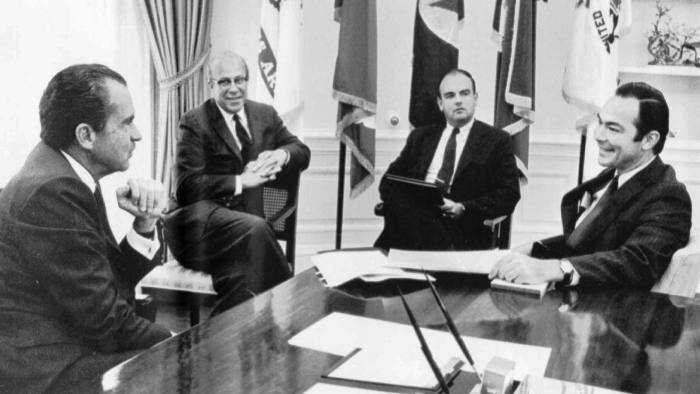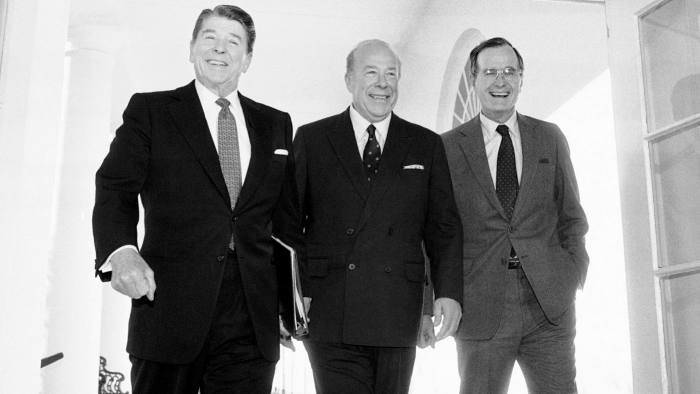Obituary: George Shultz, Reagan’s secretary of state, 1920-2021
George Shultz, who has died at the age of 100, held a remarkable number of cabinet posts under presidents Richard Nixon and Ronald Reagan, culminating in his six and a half years as secretary of state under the latter.
Shultz lacked the glamour, the flair for publicity (and the deviousness) of one of his predecessors, Henry Kissinger, but had other assets. He was more straightforward and more naturally American. He had wide experience in labour law and industrial relations as well as economics before having to apply himself seriously to foreign policy.
He was also lucky. During the Reagan administration the leadership of the Soviet Union changed. It was much easier for the US to deal with the new leader, Mikhail Gorbachev, and his foreign minister, Eduard Shevardnadze, than it had been with the old regime, notably the longstanding foreign minister, Andrei Gromyko. Shultz’s relations with Shevardnadze were friendly and productive. As a result, there were achievements in arms control, in reducing regional conflicts and in placing human rights on the US-Soviet agenda.
George Pratt Shultz was born in Manhattan on December 13 1920, the only child of a man who developed training programmes for the New York Stock Exchange. His mother was the daughter of a Presbyterian missionary. Education, and the practical application of it, was all. At Princeton he majored in economics, but also studied public and international affairs. His senior thesis was on the agricultural programme of the Tennessee Valley Authority and included a spell living with some of the families involved.
He was about to move on to do a PhD in industrial economics at the Massachusetts Institute of Technology when war intervened. Shultz applied to join the Royal Canadian Air Force at the start, but was turned down because of poor sight. After Pearl Harbor, he was accepted by the US marines and served mainly in the Far East. When the war was over, he took his place at MIT and for a while was in a class of only two taught by Professor Paul Samuelson.
A life-long academic career could have followed. Shultz became an associate professor of industrial relations at MIT, then professor of industrial relations at the Graduate School of Business in Chicago and was the Dean of the School from 1962-68. Throughout the period, however, he was close to government. In 1955 he was a senior staff economist for the president’s Council of Economic Advisers under Arthur Burns and he was frequently consulted on industrial disputes.
The newly elected president Nixon called him to the cabinet as secretary of labour in 1969. Shultz moved on to head the reorganised Office of Management and Budget in the White House before becoming treasury secretary. He departed in May 1974, shortly before Nixon’s resignation. The president had asked him to use the Inland Revenue Service to go after his “enemy list” in the Watergate affair; Shultz refused to go along.
A political life seemed to be over for him. Shultz went off to Bechtel, the engineering and construction company, and by 1981 was president of the entire Bechtel Group. The business career was interrupted by the resignation of General Alexander Haig, Reagan’s first secretary of state, in mid-1982. Reagan immediately called for Shultz to replace him — and almost as quickly — Schultz accepted. It was the beginning of a long, and on the whole constructive, period of US foreign policy.
Shultz was intensely loyal to the president. He respected his instincts if not always his intellect and, although there were conflicts and the occasional offer of resignation along the way, Reagan stayed loyal to Shultz. The secretary of state’s main criticism of the president was his lack of attention to detail and an inclination to support Third World autocrats, provided they were firmly anti-communist. A particular case was president Ferdinand Marcos of the Philippines, whom Reagan would have backed to the hilt. Shultz preferred a move to democracy and prevailed.
Much of this came out in detail later in Shultz’s huge book Turmoil and Triumph, My Years as Secretary of State, published in 1993. So did a host of other problems, many of them familiar to any US administration. Departments of government in Washington do not always get along together and do not always know what another is doing. In the Reagan-Shultz period it happened in spades. Some of the White House staff went their own way. The CIA did not always reveal what it was up to and its judgments were often wrong. The National Security Council frequently disagreed with the state department and the Pentagon under Caspar Weinberger was developing its policy of refusing to commit ground troops abroad while opposing any concessions to the Soviet Union on arms control.
A spectacular example was the Iran-Contra affair, in which a group of officials and some freelancers sought to sell weapons to Iran during the Iran-Iraq war and siphon some of the proceeds to Contra rebels in Nicaragua. President Reagan knew nothing about it; neither did Shultz at the start, but when he found out he was appalled at the undermining of official foreign policy and, as he delved deeper, his anger grew. It was the closest he ever was to sudden departure, either by sacking or resignation. He stated his position in a television interview while admitting that, unusually, he was speaking without the authority of the president, but in the end Reagan, having finally absorbed the facts, supported him.
Shultz was not a soft man. He would have supported the use of force more often than he was allowed. In negotiations with the Soviets he refused to make concessions in advance and in one of his favourite words — waited for them to “blink”. Under Gorbachev and Shevardnadze they usually did because, as Shultz well knew, they had become more concerned about affairs at home than an aggressive foreign and defence policy.
In US-Soviet relations he had four main aims, to which he stuck throughout: a mutual reduction in nuclear weapons, the improvement of bilateral relations, a lessening of regional conflicts where the superpowers were involved, and a Soviet recognition of the importance of human rights. In all he had some success. Apart from the agreements on arms control, the Soviet Union decided to withdraw from Afghanistan. It did not oppose a settlement in South West Africa (now Namibia) and supported the UN resolution which finally ended the Iran-Iraq war. Above all, gradually the Soviet leadership agreed to let dissidents leave the country.
Where Shultz differed from Kissinger was in dropping the concept of “linkage” under which a setback in US-Soviet relations in one part of the world would lead inevitably to repercussions in another. There was no tit-for-tat, only patient diplomacy. He was not a charismatic man and scarcely uttered a memorable phrase. Yet General Colin Powell said of him at a farewell dinner that by the end the head of the NSC and the secretary of state had “never gotten on so well together since the days of Henry Kissinger”. Kissinger held both posts simultaneously. Shultz worked by applying his experience of industrial relations to foreign policy. It was not a bad approach.
In later years, he joined the board of Theranos, the blood-testing group hit by scandal after it emerged its founder knowingly oversold the capabilities of the group’s technology, putting patients’ lives at risk. His presence drew in other well-known establishment figures. Shultz’s grandson, Tyler, who worked for the company for eight months after graduating from Stanford, was the first whistleblower to alert regulators of the problems inside the company.
Last year, Schultz warned the Republican party that without an ambitious plan to address climate change it would lose younger voters. In an opinion piece written in January, he argued that carbon pricing was the best policy solution to combat climate change, and should be adopted by Republicans over regulations or subsidies.
Shultz’s death was announced on Sunday by the Hoover Institution, where he was the Thomas W and Susan B Ford Distinguished Fellow.
Shultz is survived by his wife, Charlotte Shultz, his five children, 11 grandchildren and nine great grandchildren.
Additional reporting by Aime Williams in Washington



